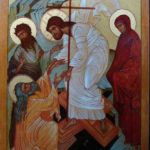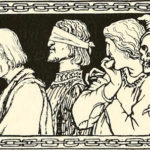We run our website the way we wished the whole internet worked: we provide high quality original content with no ads. We are funded solely by your direct support. Please consider supporting this project.

When God Wears Masks
At various times throughout the OT we find Yahweh assuming the role of a tester, refiner, punisher and even an enemy of Israel (e.g. Jer. 9:7; Lam. 2:5; Isa 63:10). Yet, when we examine these roles, or masks, in the light of the crucified Christ and the broader canonical witness, it becomes clear that these were roles God only reluctantly played.
In Jeremiah, for instance, we find the Lord declaring; “I will refine and test them, for what else can I do because of the sin of my people” (Jer. 9:7). Just as Joseph, out of love for his brothers, temporarily played the role of a harsh task-master over his brothers in order to test them and eventually lead them to repentance (Gen. 42), so God evidently was willing to assume “strange” and “alien” roles whenever doing so would benefit his people in the long run. Or, to draw an analogy from another biblical character, these passages suggest that God, like the apostle Paul, was willing to “become all things to all people” in order to further his purposes in the world (I Cor. 9:22).
Another example of God’s accommodating flexibility concerns the fact that, while OT authors frequently construe Israel’s relationship to Yahweh along the lines of a slave-master relationship, the Lord announced through Hosea that he dreamed of a future time when “you will no longer call me ‘my master’” but would instead “call me ‘my husband’” (Hos. 2:16). The implication, clearly, is that the master-slave relationship was not reflective of God’s true character and will. All divine portraits of Yahweh as a master over slaves must therefore be understood to involve an element of accommodation to the culturally conditioned, wounded and sin-stained way the former slaves he brought out of Egypt were inclined to view him. God was stooping to meet people where they were and to bear their sin in order to eventually bring them to the place he wanted them to be.
Yahweh’s dream for a husband-wife relationship, announced through Hosea, begins to be accomplished in a full way in the kingdom Jesus inaugurated. The Gospels present Jesus as the divine bridegroom who came looking for his bride (Mark 2:19) and the NT depicts all disciples as part of his collective “bride of Christ.” As ancient Jewish bridegrooms frequently did during the interval between the betrothal period and the wedding day, our heavenly bridegroom has gone to “prepare a place for us” (Jn. 14:2). And as betrothed women frequently did as they waited for their bridegroom to return, we who are “the bride” of Christ are to be in the process of making ourselves ready so when he returns, we’ll be a bride “without spot or wrinkle” (Rev 19:7). God’s age-long dream of setting aside the “master” mask and of acquiring a people who see themselves as his spouse rather than his servants is in the process of coming true.
Closely related to this, in Christ we find God setting aside the mask of a harsh “master” in order to relate to his people as a beloved friend. Echoing Yahweh’s words in Hosea 2:16, Jesus tells his disciples,
I no longer call you servants, because servants do not know their master’s business. Instead, I have called you friends, for everything that I learned from my Father I have made known to you (Jn 15:15).
So long as God had to stoop to wear the mask of a “master,” his “business,” as well as his true character, was kept somewhat concealed from his people. But now, in Christ, God has disclosed the heart of his “business”—the “mystery hidden from long ages past” (Rom. 16:25)—and with it, he has disclosed the true nature of his loving, other-oriented character.
Photo credit: Leonorah Beverly via Visualhunt.com / CC BY-NC-SA
Category: General
Tags: Bride of Christ, Character of God, Cruciform Theology
Topics: Attributes and Character
Related Reading

The Key to Understanding the Bible
In yesterday’s post we discussed how Jesus is the starting point for interpreting Scripture. If this is the case and Jesus is the subject matter of all Scripture, then the ultimate challenge is to disclose how each aspect of Scripture bears witness to his subject. To state it otherwise, if the intended function of all Scripture is to mediate…

God is Not What You Expect
Jesus came, in part, to finally reveal the absolute truth about God. He is the way and the truth (alethia) and the life (Jn 14:6). The word “truth” means “uncovered.” And what we find once God is uncovered is that he’s completely different than what we fallen humans generally expect God to be. As we…

The God Who Stoops
The way that one imagines God can be thought of along the lines of a Rorschach test. That is, I submit that the way a person imagines and experiences God says at least as much about that person as it does God. The more estranged people are from God, the more their knowledge of him is…

Sending Evil Spirits
In several infamous biblical depictions of Yahweh in the Old Testament, God is depicted as “sending” spirits to trouble and/or deceive people (Judg 9:22-3; 1 Sam 16:14, 23; 18:10; 19:9; 1 Kg 22:20-3). While there are several exegetical considerations that arguably help alleviate the problematic way these passages implicate God in unethical behavior, I nevertheless…

Where Psychology and Theology Meet
Guest post by Ty Gibson The biblical narrative reveals that God bears our guilt—not merely in the penal sense that Reformed theology asserts—but in the sense that He bears our misconceptions of His character as we project our sins upon Him. To the degree that fallen human beings find it psychologically impossible to bear the…

Can You Believe It?
The origin of human sin and the world’s oppression goes back to a deceptive, untruthful picture of God given to Eve by Satan. Jesus came, in part, to finally reveal the absolute truth about God. He is the way and the truth (alethia) and the life (Jn 14:6). The word “truth,” literally means “uncovered.” And…
